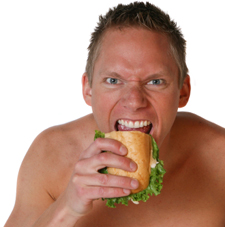 What does polyphagia mean? More importantly, what does it and diabetes have in common? The term describes a medical symptom that means excessive hunger or appetite. The term originates from Greece, where poly (poli) means “many” or “too much” and phagia (fai) means food.
What does polyphagia mean? More importantly, what does it and diabetes have in common? The term describes a medical symptom that means excessive hunger or appetite. The term originates from Greece, where poly (poli) means “many” or “too much” and phagia (fai) means food.
As many will recall, one of the most common symptoms of diabetes is excessive hunger. The word is simply the medical term that describes this symptom; it is not a disease in and of itself.
While most commonly it is used to describe a symptom of diabetes, it actually is used to describe the same symptom in a number of different diseases.
For example, diseases such as Prader-Willi Syndrome (compulsive eating) and Kleine Syndrome (hyperthalmus disorder) have excessive hunger as a symptom. Polyphagia is used to describe a symptom of eating disorders such as anorexia. Pregnancy and low blood sugar may also cause a person to experience excessive hunger.
Don’t Panic!!
The challenge for people who experience excessive hunger is that they should not automatically assume they have diabetes. As noted above, excessive hunger could be a symptom of any number of different conditions. More importantly, excessive hunger may be symptomatic of nothing. Huh?
That’s right it may be nothing at all. Different people have different metabolisms. Moreover, our bodies experience different urges or cravings depending upon our age, exercise level, and size.
Diabetes and Polyphagia
Ok, so despite the above benign reasons you may have excessive hunger, you may still think your hunger is related to diabetes. This could be because you think you have diabetes (pre-diabetes) or you already have diabetes and are experiencing massive hunger.
Thus, why the hunger? Most commonly, when your cells do not get enough glucose (blood sugar) they become “hungry.” Your body is either not able to produce insulin or are resistant to insulin, so the glucose cannot be processed.
Essentially, your brain receives a “message” from the cells that they need glucose (food) and it needs as much as you can give them! How does your body express its need for glucose? You guessed it, you become hungry.
Unfortunately, if you have diabetes, you won’t be able to do much to alleviate this situation without speaking with a doctor to help you with an appropriate treatment. Eating more food will not solve the “hunger problem” experienced by your cells.
Excessive hunger can be a bit complicated as the underlying cause can be a bit tricky to diagnose. Don’t be afraid to talk to your doctor and don’t assume you know what the problem is (or isn’t for that matter).
One final note, the term should not be confused with the word polydipsia, which means excessive thirst. Polydipsia is also another symptom of diabetes.
By Erich Erich Schultz – Last Reviewed August 2012.
